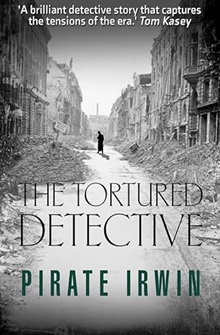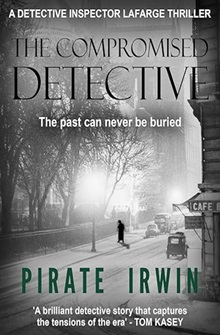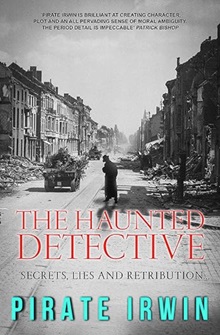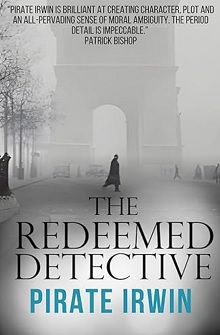Articles
Click on the links below to read the full article
Book Reviews
Author Interviews


Arletty
 General de Gaulle wanted to bring the country together. The message he wanted spun was that only a minority had been collaborators which was far from the truth. Aside from trying the Vichy paladins, Petain and Laval among them, plus others based in Paris such as the writer Robert Brasillach and another journalist turned newspaper publisher Jean Luchaire, like Laval and a lot of the collaborators a man of the left, he did not wish for widespread retribution. However, outside Paris there were many cases of extra-judicial punishments especially in small communities. Just like during the Occupation many were denounced unjustly simply because their neighbour coveted their property. Women were often punished simply for ‘horizontal collaboration’ having German lovers and were dragged into the street stripped and their heads shaved, sometimes being branded with a swastika. Around 20,000 women suffered this humiliation – including the superstar Arletty – and often those shaving their heads had been collaborators themselves. Some blame de Gaulle’s diktat for why France has never really come to terms with itself over that turbulent and shameful time.Collaboration is a difficult subject even today. Was a Bistro waiter considered a collaborator, or did it require a more active involvement and assistance to the Nazi regime in France? So long as the Bistro waiter just did his job and served the Nazis he would not be considered a collaborator. However, if he were to pass on information compromising a client then he crossed the line. A tougher one was if you were an ordinary uniformed policeman. Instinctively they would know rounding up Jews was wrong. Many still carried out the orders but some had the humanity and moral courage to forewarn the Jews in the areas of Paris targeted what was planned. René Bousquet makes an appearance in the novel. What sort of man was he? Talented but a truly dreadful human being. He had been hailed as a hero when along with a friend he saved many from being drowned in floods in 1930. He was to Vichy what Jean Moulin was to the Resistance. Like Moulin he came from the left, but Laval became a mentor to him and thus the die was cast plumping for Vichy. By all accounts an opportunist he chose the side he thought would win, but Vichy also suited his anti-Semitism. He was only 33 when he was appointed secretary-general of the police. Vichy had many incompetent nonenties but sadly for the Jews in France he was not one of them. An accomplished administrator, dynamic, intelligent, dapper rarely seen without a cigarette in his hand. He was ruthlessly ambitious and insisted on Jewish children being included in the round-ups, something even the Nazis did not want. The fact he had a son of the same age of many of the Jewish children did not jar his conscience. Largely only loyal to himself two exceptions were Laval, who he stayed with on the eve of the latter’s execution, and Francois Mitterrand. That association was to serve him well later in life. He was charismatic and dominated his trial in 1949 and the Jewish issue was only discussed for three hours, him speaking for two of them. He flourished after that, was protected by Mitterrand and never expressed a word of remorse even in the decades after the war. This is your 5th novel – did you plan to write this many when you embarked on the series? Lord, absolutely not! Having a day job that entails a lot of writing I thought it might well stop there. However, I grew too fond of Gaston Lafarge and his complex morals. That along with being able to involve him in real life events and Lafarge’s desire for Bousquet’s victims to receive justice – even if they did not in reality historical fiction gives one the flexibility to push the boundaries of truth -- prompted me to carry on. In the end it has been possible to balance both the job and the pleasure of writing the Lafarge series. Are there further plans for Lafarge in a 6th? Yes, for sure. There is life in the old dog yet. Mitterrand and Bousquet have not seen the end of him which should annoy them immensely and anything that provokes that reaction in those two particular personalities is extremely satisfying.
General de Gaulle wanted to bring the country together. The message he wanted spun was that only a minority had been collaborators which was far from the truth. Aside from trying the Vichy paladins, Petain and Laval among them, plus others based in Paris such as the writer Robert Brasillach and another journalist turned newspaper publisher Jean Luchaire, like Laval and a lot of the collaborators a man of the left, he did not wish for widespread retribution. However, outside Paris there were many cases of extra-judicial punishments especially in small communities. Just like during the Occupation many were denounced unjustly simply because their neighbour coveted their property. Women were often punished simply for ‘horizontal collaboration’ having German lovers and were dragged into the street stripped and their heads shaved, sometimes being branded with a swastika. Around 20,000 women suffered this humiliation – including the superstar Arletty – and often those shaving their heads had been collaborators themselves. Some blame de Gaulle’s diktat for why France has never really come to terms with itself over that turbulent and shameful time.Collaboration is a difficult subject even today. Was a Bistro waiter considered a collaborator, or did it require a more active involvement and assistance to the Nazi regime in France? So long as the Bistro waiter just did his job and served the Nazis he would not be considered a collaborator. However, if he were to pass on information compromising a client then he crossed the line. A tougher one was if you were an ordinary uniformed policeman. Instinctively they would know rounding up Jews was wrong. Many still carried out the orders but some had the humanity and moral courage to forewarn the Jews in the areas of Paris targeted what was planned. René Bousquet makes an appearance in the novel. What sort of man was he? Talented but a truly dreadful human being. He had been hailed as a hero when along with a friend he saved many from being drowned in floods in 1930. He was to Vichy what Jean Moulin was to the Resistance. Like Moulin he came from the left, but Laval became a mentor to him and thus the die was cast plumping for Vichy. By all accounts an opportunist he chose the side he thought would win, but Vichy also suited his anti-Semitism. He was only 33 when he was appointed secretary-general of the police. Vichy had many incompetent nonenties but sadly for the Jews in France he was not one of them. An accomplished administrator, dynamic, intelligent, dapper rarely seen without a cigarette in his hand. He was ruthlessly ambitious and insisted on Jewish children being included in the round-ups, something even the Nazis did not want. The fact he had a son of the same age of many of the Jewish children did not jar his conscience. Largely only loyal to himself two exceptions were Laval, who he stayed with on the eve of the latter’s execution, and Francois Mitterrand. That association was to serve him well later in life. He was charismatic and dominated his trial in 1949 and the Jewish issue was only discussed for three hours, him speaking for two of them. He flourished after that, was protected by Mitterrand and never expressed a word of remorse even in the decades after the war. This is your 5th novel – did you plan to write this many when you embarked on the series? Lord, absolutely not! Having a day job that entails a lot of writing I thought it might well stop there. However, I grew too fond of Gaston Lafarge and his complex morals. That along with being able to involve him in real life events and Lafarge’s desire for Bousquet’s victims to receive justice – even if they did not in reality historical fiction gives one the flexibility to push the boundaries of truth -- prompted me to carry on. In the end it has been possible to balance both the job and the pleasure of writing the Lafarge series. Are there further plans for Lafarge in a 6th? Yes, for sure. There is life in the old dog yet. Mitterrand and Bousquet have not seen the end of him which should annoy them immensely and anything that provokes that reaction in those two particular personalities is extremely satisfying.  Pirate Irwin is a journalist and writer and the author of The Redeemed Detective.
Pirate Irwin is a journalist and writer and the author of The Redeemed Detective.
 Pirate Irwin is the author of the bestselling Lafarge series. His latest novel is The Redeemed Detective.
Pirate Irwin is the author of the bestselling Lafarge series. His latest novel is The Redeemed Detective.
Pirate, The Redeemed Detective is the latest of your Inspector Lafarge novels, but we’re now in 1947 and he’s been through much. How has his character changed since The Tortured Detective which starts in 1942?
He has certainly been through the wringer, emotionally and physically. That evidently takes its toll. His sense of right and wrong in terms of collaboration remains the same and his determination to bring to justice his bete noire Rene Bousquet. He is as ruthless as he was from the start – willing if others won’t to dispense justice a la Lafarge style -- but he is more willing to listen to reason from those he respects, which admittedly is a pretty small group.
He is even more complex than when one first meets him in The Tortured Detective, loss of family and friends and an endless succession of betrayals might do that to one! However, perversely he has a deep sense of loyalty too in spite of that and a strong belief in helping those down on their luck and victims of prejudice. This develops as he experiences his own hardships.
I think too he becomes a warmer character having initially appeared cold and calculating. He does not act out of self-interest but because it will help others. He also learns from his mistakes – well some of them – and reforms himself including by the time we swing round to The Redeemed Detective one major habit – and it’s not smoking Gitanes which remains a staple diet.
Alarmingly for some readers and the cognac industry he gives it up – now if that is not a reformed character what is!
Why did Lafarge not head to London and join up with De Gaulle and the Free French?
Very good question! However, he had been a POW for nigh on two years and it was due to the influence of his father, who was a trusted advisor of Marshal Petain, that he was one of those released.
The continuing imprisonment of POWs was a huge bone of contention for Vichy and the Nazis. It caused many problems for Petain and his Prime Minister Pierre Laval with the French people – never mind those behind the barbed wire -- throughout the Occupation. Thus to have secured one of the spots Lafarge felt indebted to his father, plus it was on condition he returned to his former post as a detective.
He also was not too enamoured by army life due to his experiences in the collapse in 1940. Some of his men furious with his refusal to surrender had tried to murder him. Thus he felt it wiser to return to something he did rather well.
One of his brothers had joined the Free French as a fighter pilot but Lafarge felt he should remain and work within the constraints of his job not just as a tool of Vichy and the Nazis but wherever possible to undermine their basest policies.
Evidence is there of his efforts, he saves a Jewish couple, he pistol-whips and arrests a uniformed policeman for shooting dead a young Jewish boy – and pays for it. He is not a resistant per se as in belonging to a cell, some policemen were and many of them were executed by the Nazis.
He was far from alone in deciding against joining de Gaulle – although the General was better known by 1942 but there were many who believed it best to stay home and do their bit but it was certainly riskier.
The subject of the novel is one that has dogged France ever since May 1940: collaboration. Do you think France has come to terms with this facet of its past?
Nope. Absolutely not. De Gaulle’s policy of France coming together and declaring that only a minority had committed treason I believe whilst pragmatic and helped him in his desire to be the nation’s leader post liberation has done a huge disservice to France and confronting the many crimes committed during the Occupation.
It took till 1995, when Jacques Chirac was elected, for a president to address the issue and no one better than a man nicknamed ‘The Bulldozer’ to do so. Indeed, he was the bearer of the de Gaulle flame – even his noble proboscis could rival that of the General’s.
Other presidents had protected notorious collaborators – Giscard d’Estaing included Maurice Papon – who had signed off on deportations of Jews from Bordeaux (and his lust for blood was not sated as he then presided over the mass murder of Algerian protestors on October 17 1961 when he was in charge of the Paris police) -- in his cabinet.
Chirac though made no bones about it trying to set the record straight by courageously declaring in a speech on the day of the commemoration of the Vel d’Hiv round-up the French state was complicit in the deportation of the Jews. Quite a few in his own Gaullist party were appalled by his remarks but no one spat tacks more than his predecessor Francois Mitterrand.
Mitterrand’s past was as chequered as many of his contemporaries and he had even been awarded the francisque for his services to Vichy. He did later join the Resistance but his protection post war of Rene Bousquet, chief of Police under Vichy and responsible for the Vel d’Hiv roundup and many other calumnies which resulted in those Jews being murdered in the camps, compromised him further.
It says a lot that Chirac was the first French head of state to not send flowers to be placed on Petain’s tomb on the anniversary of his death. Almost as impactful is that it was an American historian Robert O Paxton who in 1972 in his book exposed Vichy for all its evil – earning him a lot of abuse and finally opened up a proper debate.
Nevertheless with populism on the rise and Marine Le Pen growing in popularity Vichy gets a clean bill of health from her and that is extremely dangerous. Not as brutish as her thug of a father – who adopted Petain’s ‘travail, famille, patrie’ motto when he reached the second round of the presidential election in 2002 (Chirac refused to debate with him and whipped him) -- she denies despite the overwhelming evidence Vichy played a role in the deportations. Her protege Jordan Bardella displaying an oafish lack of gravitas openly disrespected French icon and Resistance hero Jean Moulin in a debate during the recent elections, his smirk was revolting to behold.
This is dangerous because if they do ascend to power then Vichy gets a free ride. If you misrepresent history it is not good for the country and prevents a genuine coming together built on the truth.
René Bousquet, Vichy’s Chief of Police, makes an appearance, as he has done in your previous novels. Does he make the ideal villain?
Oh yes he does....though it sounds like a line from a pantomime there is nothing remotely amusing about this ruthlessly ambitious highly capable technocrat. Moulin was around 11 years older than him, both were young rising stars pre-war but one chose the path of honour, the other the path of evil.
Bousquet was a moral coward rather than a physical one – in 1930 aged just 20 he along with a friend Adolphe Poult (who died in the process) had shown great courage to rescue many from deadly floods in his region of France – but 12 years later he was ordering his police to round up Jews in Paris.
A rabid anti-Semite he along with one of his mentors and fellow chain smoker Pierre Laval readily acceded to Nazi demands for delivering them Jews. I will give one example of how evil he was. The Nazis did not want children rounded up initially, even Petain baulked at that, but Bousquet went against their wishes and ordered them swept up.
Not once during his gilded life post war as Mitterrand – whose life Bousquet had saved during the Occupation -- and others protected him did he express any remorse not even as he faced trial – a proper one not the sham one of 1949 – in 1993.
There have been claims by his defenders that he was also helpful to the Resistance...there is as yet not one document that attests to this. They point to his having resigned at the end of 1943 but again he was clever and ever the opportunist seeing the way the war was going jumped because of that.
I think we can safely look at the infamous photograph of him dressed in a fur lined coat, cigarette as always in his hand, smiling alongside his uniformed German friends after the Marseille round-up as the truthful image of perhaps the most evil man in French history.
Bousquet’s murder in 1993 has echoes in your novel – albeit the killing taking place much later. Do you think Bousquet’s death was beneficial to a French state that had still not really acknowledged the impact of the Vichy government?
I think it was extremely beneficial to Mitterrand and the state, but a serious blow to those who wanted the truth to finally come out albeit 48 years after the end of hostilities.
A trial would have hopefully allowed a proper assessment and exposure of Vichy and have grabbed the public’s attention. The previous high-profile trial, Lyon Gestapo chief Klaus Barbie in 1987, had been a bit of a damp squib as he failed to answer the question everyone wished to know the answer to – who betrayed Jean Moulin.
Bousquet would have maybe settled scores finally or stayed mute but one can say there were many people relieved when Christian Didier -- on a day when a police presence was remarkably absent outside and inside his apartment building -- shot him dead. In doing so Didier destroyed the final chance of exposing the evils of Vichy by trying the last of the paladins and thereby denying the Le Pen family of propagating the myths about it.
In your day job as a reporter for Agence France Presse do you find the Mitterrand quote you use in The Tortured Detective (‘There is no such thing as white or black there is just grey’) to be a truism that is less so in your novels?
As an agency journalist we do have to be neutral, so I guess that can be described as grey if one construes it as there being two sides to the story. However, that is not to say the pieces lack colour in the telling!! For me Mitterrand’s remark given when asked why he remained friends with Bousquet is patent nonsense – there was no grey area as I already elaborated on above.
The novel is dedicated to Arman Soldin, the Bosnian-French journalist. Can you tell us a bit about him?
Arman was a very special person, a rare bird in not having a malicious thought or bone in his body. Always there with a ready smile, an infectious laugh – I nicknamed him ‘Armani’ for his style and the ‘man in the red shoes’ due to his sneakers. He was also a darn good journalist blessed with great imagination and his charm and empathy played brilliantly in procuring great responses from interviewees.
There is a sad irony in that he was born amidst a war in the Balkans, his parents got him out and decades later a wonderful talent was extinguished on a battlefield. It says it all he rescued a cat shortly before he died. That is the sort of guy he was, and AFP and the world is a far poorer place without him.
Dedicating the book to him is the least I could do to honour him.
When is the next Lafarge novel?
With the Olympics and Paralympics – magnificent beasts as they are – out of the way I can focus more on writing the next one and hope it emerges into the public glare in April next year. Gaston has a few more packets of Gitanes in him yet and collaborators cannot breathe easy!!
 Pirate Irwin is the author of the bestselling Lafarge series. His latest novel is The Redeemed Detective.
Pirate Irwin is the author of the bestselling Lafarge series. His latest novel is The Redeemed Detective.Author Interview



Pirate, The Redeemed Detective is the latest of your Inspector Lafarge novels, but we’re now in 1947 and he’s been through much. How has his character changed since The Tortured Detective which starts in 1942?
He has ...








